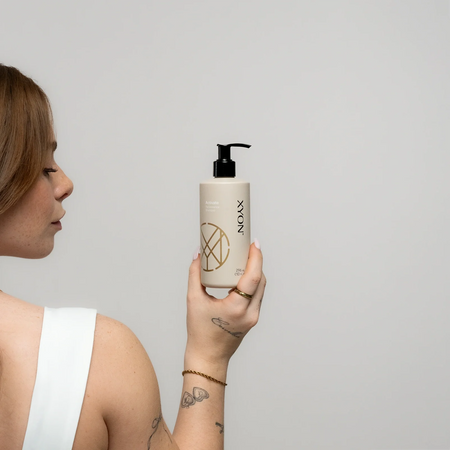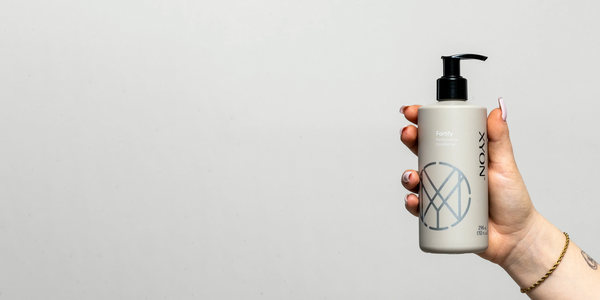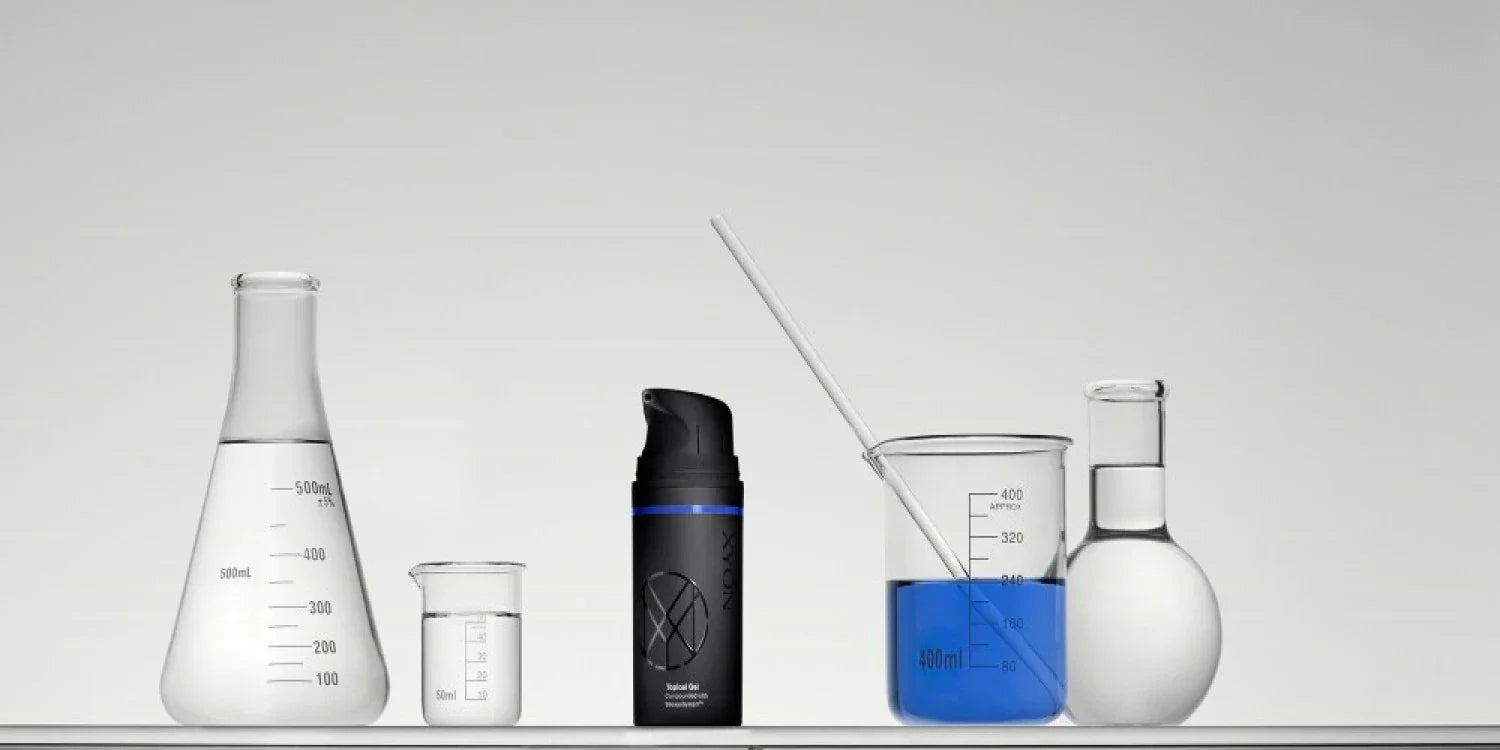Whether you’re somebody who meticulously reads the ingredients list of every product you buy, or maybe you just glance at the front label, we are likely all using ingredients on our skin and hair that we don’t fully understand. One of these controversial ingredients is dimethicone. Is dimethicone safe? And what benefits does dimethicone really have for our hair?
Consider this article your cheat sheet on this commonly used cosmetic ingredient and keep this information in mind the next time you walk down the hair care aisle at your local pharmacy.
What is dimethicone?
Dimethicone is a type of silicone which is commonly used in a variety of skincare and hair care products. It's produced synthetically in a lab, but don’t let that put you off; it’s a safe and even hypoallergenic ingredient, as established by the Cosmetic Ingredients Review (2019). Formulators consider dimethicone to be a useful addition to cosmetic products because of its ability to improve the texture of formulas, giving them a silkier and smoother feel when applied to the skin or hair.


Dermatologist formulated hair care, from the hair loss experts at XYON
Our shampoo and conditioner have been carefully developed using only the best ingredients to ensure healthy, beautiful hair
What does dimethicone do to hair?
You’ll most likely come across dimethicone in hair conditioners and this is because it’s a great ingredient for helping to achieve a smooth and shiny finish to your hair. As a non-water-soluble silicone, dimethicone creates a protective layer over the hair shaft which helps to seal the cuticle layer of strands and lock any moisture into the hair.
The cuticle refers to the outermost part of the hair strand and it’s formed of overlapping layers of cells which are responsible for absorbing and retaining moisture. When your hair is exposed to damaging processes, such as hair dying, gaps can form in the layers and make it difficult for hair strands to retain any moisture. This can lead to dry and brittle hair that breaks easily. So, this is where dimethicone comes in.
By helping to seal this layer, products containing dimethicone allow your hair strands to not only stay hydrated on the inside, but also look and feel smoother on the outside. In fact, a study looking at the effects of adding dimethicone and other conditioner agents into hair dye, found that the incorporation of the conditioner agents into the dye decreased the damage to the hair, in terms of protein loss and breakage strength of hair strands (Gama et al, 2018).
If you’re looking for a product to help with moisture retention and achieve a silky finish, our Fortify Performance Conditioner for women is a great option. Containing dimethicone and other nourishing ingredients, such as panthenol, our conditioner has been formulated with healthy and hydrated hair at the forefront. And, it has added benefits for thinning hair, with the addition of plant-based agents that have been shown to support hair health like ginseng, which helps to enhance the hair growth cycle (Song et al, 2021).
Can dimethicone be bad for hair?
There is a certain stigma associated with the inclusion of silicones in hair products; namely, that they can be damaging ingredients for hair. Fortunately, there isn’t much scientific evidence to back these ideas and instead, dimethicone remains a beneficial ingredient to have in your hair routine.
One of the concerns that some consumers have about the presence of dimethicone in hair products is the build-up of this ingredient on hair strands. Because dimethicone repels water, it’s true that it can be difficult to fully wash it out of your hair. In some cases, this can cause your hair to become dry overtime, as extra moisture struggles to enter the sealed cuticle of the strands. But don’t panic, there’s a simple answer to avoid this problem.
If you’re using a conditioner containing dimethicone regularly and are worried about experiencing product build-up, using a clarifying shampoo intermittently alongside your usual shampoo can help. The surfactants (cleansing agents) in many clarifying shampoos help remove existing buildup, allowing conditioning ingredients and moisture to reach the hair shaft. But keep in mind that carefully formulated conditioners that contain silicone often also contain cleansing agents that mitigate this problem, without having to introduce another step.
Does dimethicone cause hair loss?
No, dimethicone doesn’t directly cause hair loss. In fact, there doesn’t seem to be any literature to suggest that dimethicone causes hair loss. Instead, this theory could come from people experiencing hair breakage after long-term use of products containing dimethicone. The barrier that dimethicone creates on the hair shaft is great for protecting hair against physical and chemical damage, but it can also impede the ability for moisture to enter the strands. Again, adding a clarifying shampoo to your routine if you’re experiencing breakage could help minimize this issue. It’s also important to understand that this kind of breakage is not common.
Another point to bear in mind is that conditioner is ultimately a detangler, so when you’re using it in the shower, hairs that have been naturally shed will become loosened and this can give the appearance that you’re losing hair. Before pointing the finger at dimethicone, it’s worthwhile taking a look at other hair care practices, e.g., bleaching, coloring, heat styling, that might be compromising the integrity of hair and having more immediate effects on the health and strength of your strands.
Hair loss can be caused by multiple factors and you shouldn’t discount any hair shedding without speaking to your doctor. If you’re concerned about hair loss, we invite you to connect with one of our hair loss specialists at XYON. They’ll use their expertise to guide you through your treatment options, so that you can be sure that you’re taking the best care possible of your hair.
Takeaway
Ultimately, dimethicone isn’t bad for your hair. In fact, it can be the opposite. In hair conditioners, dimethicone can help to protect your strands against damaging processes, such as hair dyes and natural external factors, including UV rays. It also helps your hair to retain moisture, ensuring that your hair stays hydrated and maintains a smooth and silky appearance. Any concerns about product build-up can easily be addressed by adding a clarifying shampoo into your routine occasionally, alongside your regular shampoo.
References
Dimethicone, methicone and substituted-methicone polymer ingredients. (n.d.). Cosmetics Info. Retrieved September 10, 2024, from https://www.cosmeticsinfo.org/ingredient/dimethicone/
Gama, R.M., Franca-Stefoni, S.A., Sa-Dias, T., Bedin, V., Baby, A.R., Velasco, M.V.R. (2018). Protective effect of conditioner agents on hair treated with oxidative hair dye. Journal of Cosmetic Dermatology, 17(6), 1090-1095. https://doi.org/10.1111/jocd.12484
Song, P.H., Park, G.R., Kim, Y.H., Jung, D.H., Ku, A.K., Song, C.H. (2020). Hair growth-promoting effects of fermented red ginseng marc and traditional polyherb formula in C57BL/6 mice. Applied Sciences, 11(3), 1195. https://doi.org/10.3390/app11031195



